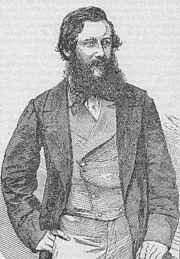John Speke
| John Hanning Speke | |
|---|---|
 |
|
| Born |
4 May 1827 Bideford, Devon, England |
| Died | 15 September 1864 (aged 37) Neston Park, Wiltshire, England |
| Occupation | Military officer and explorer |
John Hanning Speke (4 May 1827 – 15 September 1864) was an officer in the British Indian Army who made three exploratory expeditions to Africa. He is most associated with the search for the source of the Nile and was the first European to reach Lake Victoria. He is also known for propounding the Hamitic hypothesis in 1863, in which he supposed that the Tutsi ethnic group were descendants of the biblical figure Ham, and had lighter skin and more "European" features than the Bantu-featured Hutu over whom they ruled.
Speke was born on 4 May 1827 at Orleigh Court,Buckland Brewer, near Bideford, North Devon. In 1844 he was commissioned into the British Army and posted to India, where he served under Sir Colin Campbell during the First Anglo-Sikh War. He spent his leave exploring the Himalayan Mountains and Mount Everest and once crossed into Tibet.
In 1854 he made his first voyage to Africa, first arriving in Aden to ask permission of the Political Resident of this British Outpost to cross the Gulf of Aden and collect specimens in Somaliland for his family's natural history museum in Somerset. This was refused as Somaliland was considered rather dangerous. Speke then asked to join an expedition about to leave for Somaliland led by the already famous Richard Burton who had Lt William Stroyan and Lt. Herne recruited to come along but a recent death left the expedition one person short. Speke was accepted because he had traveled in remote regions alone before, had experience collecting and preserving natural history specimens and had done astronomical surveying. Initially the party split with Burton going to Harrar, Abyssinia, and Speke going to Wadi Nogal in Somaliland . During this trip Speke experienced trouble with the local guide who cheated him and after they returned to Aden, Burton who had also returned, saw that the guide was punished and jailed. This incident probably led to larger troubles later on. Now all 4 men traveled to Berbera on the coast of Somaliland from where they wanted to trek inland towards the Ogaden. While camped outside Berbera they were attacked at night by 200 spear wielding Somalis. During this fracas Speke ducked under the flap of a tent to get a clearer view of the scene and Burton thought he was retreating and called for Speke to stand firm. Speke did so and then charged forward with great courage shooting several attackers. The misunderstanding of this incident laid the foundation of their disputes and dislikes much later. Stroyan was killed by a spear, Burton was seriously wounded by a javelin impaling both cheeks and Speke was wounded and the only one captured, Herne came away unwounded. Speke was tied up and stabbed several times with spears, one thrust cutting through his thigh along his femur and exiting. Showing tremendous determination he used his bound fists to give his attacker a facial punch and this gave Speke an opportunity to escape, albeit he was followed by a group of Somalis and he had to dodge spears as he was running for his life. Rejoining Burton and Herne the trio eventually managed to escape with a boat passing along the coast. The expedition was a severe financial loss and Speke's natural history specimens from his earlier leg were used to make up for some of it. Speke handed Burton his diaries that Burton used as an appendix in his own book on his travels to Harrar. It seemed unlikely that the two would join again and Burton believed that he would not lead an expedition to the interior of Africa, his fervent hope, after this failed journey.
...
Wikipedia
